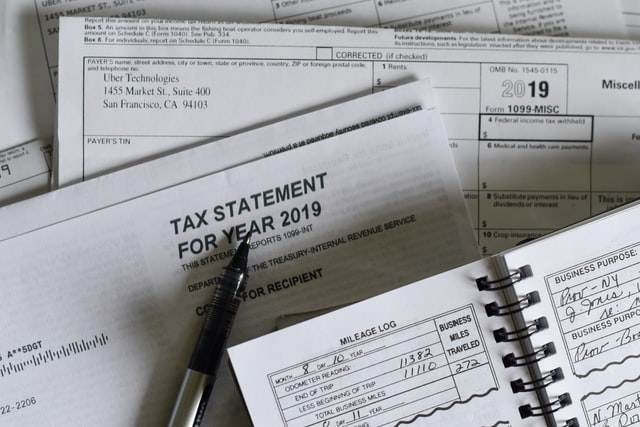Are you looking for ways to save money on your tax bill? If so, you’re in luck! In this blog post, we will discuss six clever strategies that will help you keep more money in your pocket. So whether you’re self-employed or just trying to take advantage of every deduction possible, read on for some helpful tips!
1. Invest in tax-advantaged accounts like 401ks and IRAs
401k is a retirement savings account that allows you to invest pre-tax money, which can lower your taxable income. The money you contribute will grow tax-free, and when you withdraw it in retirement, the distributions will be taxed as regular income.
An IRA (individual retirement account) is another great option for saving on taxes. With an IRA, you can contribute up to $6,000 per year or if you’re over age 50, up to $7,500. The money will grow tax-free and distributions are taxed at ordinary rates upon withdrawal in retirement.

Both of these accounts offer great benefits when it comes time for taxes! For example, 401k contributions reduce your taxable income by the amount contributed while IRA contributions may be fully deductible or at least partially deductible depending on your income level and filing status.
The best part is that either type of account will allow you to save for retirement without paying any taxes at all until it’s time for distributions! And even then, the rate of tax will only apply once per year instead of every time you take money out like with a regular bank account.
2. Use deductions to reduce your taxable income
There are a number of deductions that you may be able to take advantage of in order to reduce your taxable income. Some common deductions include:
-Mortgage interest
-Property taxes
-State and local income taxes
-Charitable contributions
-Medical expenses
Each deduction will lower your taxable income by a different amount, so be sure to research which ones you might qualify for. In order to claim a deduction, you will need to file IRS Form Schedule A with your tax return.
Remember that not all deductions are itemized; there are also a number of standard deductions that you may be able to take depending on your filing status. The standard deduction is currently $6000 for singles and $12,000 for married couples filing jointly.
If your total deductions are more than the standard deduction amount, then it makes sense to itemize them on Schedule A. However, if your total deductions are less than the standard deduction amount, then you will probably be better off taking the standard deduction rather than itemizing. The standard deduction is the same amount for all taxpayers regardless of filing status or income level so it’s better to claim this if possible.
3. Claim credits for expenses that lower your taxes

In addition to deductions, you may also be able to claim credits for expenses that lower your taxes. Some common tax credits include:
-The child tax credit
-The Earned Income Tax Credit (EITC)
-The American Opportunity Tax Credit
-The Lifetime Learning Credit
4. Take advantage of tax breaks specific to your situation
There are a number of tax breaks that may be available to you depending on your situation. Some common ones include:
-The student loan interest deduction, which allows taxpayers to deduct up to $2500 of the interest they paid on their student loans during the year. This deduction is available regardless of whether or not you itemize your deductions.
-The home office deduction, which allows taxpayers who use a part of their home for business purposes to deduct expenses related to that space.
-The earned income credit, which helps working families who have low incomes keep more of what they’ve earned by providing a refundable tax credit based on their wages and dependents.
-The foreign housing exclusion, which allows taxpayers living abroad to exclude some or all of the rental costs associated with their home from their taxable income.
-The educator expense deduction, which allows teachers and other school employees to deduct up to $250 per year for out of pocket expenses related directly to their work as educators.
-Deductions for moving expenses incurred while relocating from one job location to another (if your employer pays you back later on). These deductions are available whether or not you itemize your deductions.
Be sure to research all of the tax breaks that may be available to you in order to take advantage of as many as possible. This can help reduce your overall tax bill and keep more money in your pocket.
5. Hold off on selling investments until after the end of the year
If you are thinking about selling investments, such as stocks or mutual funds, it may be wise to wait until after the end of the year. This is because any capital gains (profits) that you earn from these sales will be taxable, and you will have to pay taxes on them even if you don’t actually receive the money in your bank account until the following year.
By waiting to sell your investments until after the end of the year, you can push off these capital gains into the next tax year and avoid paying them before they are due. This is especially helpful if you expect that you will be in a lower tax bracket during this time period (for example, if you are retired and no longer earning an income).
However, if you are thinking about selling investments that have lost value this year, it may make sense to sell them before the end of the year. This is because when you sell these investments for less than what they cost, you can use this loss to offset other capital gains (or even up to $3,000 in ordinary income).
6. File your taxes correctly and on time
One of the best ways to save on your taxes is simply to file them correctly and on time. If you make mistakes on your tax return, it can lead to delays in processing or even penalties from the IRS.
Make sure you understand all of the forms and schedules that are required for your specific tax situation, and be sure to double-check all of the numbers you enter on these forms before filing them. You should also make a copy of your tax return for your records, just in case something happens to it after you file.
You can e-file your taxes through an online service or mail them to the IRS by April 18th if you are not making any payments and April 20th if you are making payments. However, be sure to check the IRS website for the latest information on tax deadlines as these may change from year to year.
I know that taxes can be a bummer, but there are some clever strategies you can use to save more of your hard earned money. The more tax deductions and credits you’re eligible for, the less taxes will take from your paycheck. Stay tuned next week as we explore other ways you can make sure Uncle Sam doesn’t get too much of your pay!

Leave a Reply